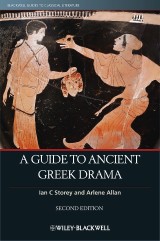Details

A Guide to Ancient Greek Drama
Blackwell Guides to Classical Literature, Band 2 2. Aufl.
|
39,99 € |
|
| Verlag: | Wiley-Blackwell |
| Format: | |
| Veröffentl.: | 08.11.2013 |
| ISBN/EAN: | 9781118455142 |
| Sprache: | englisch |
| Anzahl Seiten: | 352 |
DRM-geschütztes eBook, Sie benötigen z.B. Adobe Digital Editions und eine Adobe ID zum Lesen.
Beschreibungen
<p>This newly updated second edition features wide-ranging, systematically organized scholarship in a concise introduction to ancient Greek drama, which flourished from the sixth to third century BC.</p> <ul> <li>Covers all three genres of ancient Greek drama – tragedy, comedy, and satyr-drama</li> <li>Surveys the extant work of Aeschylus, Sophokles, Euripides, Aristophanes, and Menander, and includes entries on ‘lost’ playwrights</li> <li>Examines contextual issues such as the origins of dramatic art forms; the conventions of the festivals and the theater; drama’s relationship with the worship of Dionysos; political dimensions of drama; and how to read and watch Greek drama</li> <li>Includes single-page synopses of every surviving ancient Greek play</li> </ul>
<p>Preface to the First Edition xi</p> <p>Preface to the Second Edition xiii</p> <p>List of Figures xv</p> <p>List of Maps and Plans xvi</p> <p>Abbreviations and Signs xvii</p> <p><b>1 Aspects of Ancient Greek Drama 1</b></p> <p>Drama 1</p> <p>The Dramatic Festivals 13</p> <p>The Theatrical Space 24</p> <p>The Performance 36</p> <p>Drama, Dionysos and the<i> Polis</i> 51</p> <p><b>2 Greek Tragedy 73</b></p> <p>On the Nature of Greek Tragedy 79</p> <p>Aeschylus 93</p> <p>Sophokles 110</p> <p>Euripides 133</p> <p>The Other Tragedians 153</p> <p><b>3 The Satyr-Drama 159</b></p> <p>Cyclops 170</p> <p><b>4 Greek Comedy 173</b></p> <p>Origins 173</p> <p>Old Comedy (486 – ca. 385) 177</p> <p>The Generations of Old Comedy 197</p> <p>Aristophanes 210</p> <p>Greek Comedy and the <i>Phlyax</i><i>-</i>vases 219</p> <p>Middle Comedy 221</p> <p>Menander and New Comedy 226</p> <p><b>5 Approaching Greek Drama 237</b></p> <p>Formal Criticism 237</p> <p>Interdisciplinary Approaches 241</p> <p>Visual Interpretations 247</p> <p>Reception Studies 252</p> <p><b>6 Play Synopses 256</b></p> <p>Aeschylus’ <i>Persians </i>257</p> <p>Aeschylus’ <i>Seven against Thebes</i> 258</p> <p>Aeschylus’ <i>Suppliants</i> 259</p> <p>Aeschylus’ <i>Oresteia</i> 260</p> <p>Aeschylus’ <i>Agamemnon</i> 261</p> <p>Aeschylus’ <i>Libation</i><i>-Bearers</i> (<i>Choephoroe</i>) 262</p> <p>Aeschylus’ <i>Eumenides</i> (<i>Furies</i>) 263</p> <p>Aeschylus’ <i>Prometheus Bound</i> 264</p> <p>Sophokles’ <i>Ajax</i> 265</p> <p>Sophokles’ <i>Antigone </i>266</p> <p>Sophokles’ <i>Trachinian Women </i>267</p> <p>Sophokles’ <i>Oedipus Tyrannos </i>268</p> <p>Sophokles’ <i>Elektra</i> 269</p> <p>Sophokles’ <i>Philoktetes </i>270</p> <p>Sophokles’ <i>Oedipus at Kolonos </i>271</p> <p>Euripides’ <i>Alkestis </i>272</p> <p>Euripides’ <i>Medea </i>273</p> <p>Euripides’ <i>Children of Herakles </i>274</p> <p>Euripides’ <i>Hippolytos</i> 275</p> <p>Euripides’ <i>Andromache</i> 276</p> <p>Euripides’ <i>Hecuba </i>277</p> <p>Euripides’ <i>Suppliant Women </i>278</p> <p>Euripides’ <i>Elektra</i> 279</p> <p>Euripides’ <i>Herakles</i> 280</p> <p>Euripides’ <i>Trojan Women </i>281</p> <p>Euripides’ <i>Iphigeneia among the Taurians </i>282</p> <p>Euripides’ <i>Ion </i>283</p> <p>Euripides’ <i>Helen </i>284</p> <p>Euripides’ <i>Phoenician Women </i>285</p> <p>Euripides’ <i>Orestes </i>286</p> <p>Euripides’ <i>Iphigeneia at Aulis </i>287</p> <p>Euripides’ <i>Bacchae</i> 288</p> <p>Euripides’ <i>Cyclops </i>289</p> <p>[Euripides’] <i>Rhesos</i> 290</p> <p>Aristophanes’ <i>Acharnians</i> 291</p> <p>Aristophanes’ <i>Knights </i>292</p> <p>Aristophanes’ <i>Wasps </i>293</p> <p>Aristophanes’ <i>Peace </i>294</p> <p>Aristophanes’ <i>Clouds</i> 295</p> <p>Aristophanes’ <i>Birds </i>296</p> <p>Aristophanes’ <i>Lysistrate</i> 297</p> <p>Aristophanes’ <i>Women at the Thesmophoria </i>298</p> <p>Aristophanes’ <i>Frogs </i>299</p> <p>Aristophanes’ <i>Assembly-Women </i>300</p> <p>Aristophanes’ <i>Wealth</i> 301</p> <p>Menander’s <i>The Grouch </i>302</p> <p>Menander’s <i>Samian Woman </i>303</p> <p>A Note on Meter 304</p> <p>Glossary of Names and Terms 307</p> <p>Timeline 311</p> <p>Further Reading 316</p> <p>Index 324</p>
<p>“Whether the student has a good grasp of the language, or little (even none), they will find this an invaluable source book and study aid. It will help students of classical literature to understand the context and content of ancient Greek drama more thoroughly and more productively. Although not stated as an aim of the book, it will also help students of related subjects who need some instruction in or background to ancient Greek drama.” (<i>Reference Reviews</i>, 1 October 2014)</p>
<p><b>Ian C. Storey</b> is Emeritus Professor of Classics and Ancient History at Trent University, Canada. The author of <i>Eupolis: Poet of Old Comedy</i> (2003), <i>Euripides’ Suppliant Women</i> (2008), and <i>The Fragments of Old Comedy</i> (2011), he has published numerous papers on Euripides, Old Comedy, and the fiction of C. S. Lewis.</p> <p><b>Arlene Allan</b> is Senior Lecturer in the Department of Classics at Otago University, New Zealand, where she teaches ancient Greek literature and mythology, as well as ancient Greek and Latin.</p>
<p>Revised and updated, this second edition of Wiley’s guide to ancient Greek drama offers a concise and accessible introduction. Essential material for any student of the Classics, the content combines utility with authority, covering all three genres – tragedy, comedy, and satyr-drama. It features keynote discussions of the five playwrights whose work survives, single-page synopses of every extant play, and entries on known authors whose work has been lost.</p> <p>Regarded as a progenitor of Western drama and literature more generally, Greek drama, which flourished from the sixth to the third century BC, is one of the cornerstones of Western culture. The text offers insights into ancient Greek drama’s political and cultural context and examines its core themes. In addition to critical essays on playwrights, the contents include material on the origins and conventions of drama, the theater, the performers, and the relationship between drama and the worship of Dionysos, the Greek god of ritual, wine, and festivity. The authors also provide helpful guidance about how to read, watch, and teach Greek drama.</p>
<p>“The discussion of the contexts of ancient Greek drama, its performance, ancient and modern, is thoroughgoing and scholarly. The synopses of the plays and interpretations are invaluable tools – a must on any scholar’s bookshelf.”<br /> <i>--Robin Bond,</i> <i>University of Canterbury</i></p> <p>“Covering all the genres of Greek drama, and bringing in what is known about lost plays as well as those that we have, <i>A Guide to Ancient Greek Drama, Second Edition</i> is comprehensive, balanced, up-to-date, reliable and readable. It presents a huge amount of information, but in a distinctive and winning voice.”<br /> <i>--Ruth Scodel, University of Michigan</i></p> <p>“With revised sections on Sophocles and politics, and new discussions of Reception and vase-painting, the second edition of this handbook will be helpful to both students and scholars.”<br /> <i>--C.W. Marshall, University of British Columbia</i></p>

















